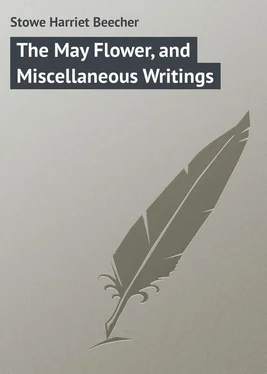Harriet Stowe - The May Flower, and Miscellaneous Writings
Здесь есть возможность читать онлайн «Harriet Stowe - The May Flower, and Miscellaneous Writings» — ознакомительный отрывок электронной книги совершенно бесплатно, а после прочтения отрывка купить полную версию. В некоторых случаях можно слушать аудио, скачать через торрент в формате fb2 и присутствует краткое содержание. Жанр: foreign_prose, на английском языке. Описание произведения, (предисловие) а так же отзывы посетителей доступны на портале библиотеки ЛибКат.
- Название:The May Flower, and Miscellaneous Writings
- Автор:
- Жанр:
- Год:неизвестен
- ISBN:нет данных
- Рейтинг книги:4 / 5. Голосов: 1
-
Избранное:Добавить в избранное
- Отзывы:
-
Ваша оценка:
- 80
- 1
- 2
- 3
- 4
- 5
The May Flower, and Miscellaneous Writings: краткое содержание, описание и аннотация
Предлагаем к чтению аннотацию, описание, краткое содержание или предисловие (зависит от того, что написал сам автор книги «The May Flower, and Miscellaneous Writings»). Если вы не нашли необходимую информацию о книге — напишите в комментариях, мы постараемся отыскать её.
The May Flower, and Miscellaneous Writings — читать онлайн ознакомительный отрывок
Ниже представлен текст книги, разбитый по страницам. Система сохранения места последней прочитанной страницы, позволяет с удобством читать онлайн бесплатно книгу «The May Flower, and Miscellaneous Writings», без необходимости каждый раз заново искать на чём Вы остановились. Поставьте закладку, и сможете в любой момент перейти на страницу, на которой закончили чтение.
Интервал:
Закладка:
"Halloo, there, you little rascal! what are you goin' off without the hoe for?"
"I didn't know as you meant to lend it."
"I didn't say I wouldn't, did I? Here, come and take it. – stay, I'll bring it; and do tell your father not to be a lettin' you hunt squirrels with his hoes next time."
Uncle Lot's household consisted of Aunt Sally, his wife, and an only son and daughter; the former, at the time our story begins, was at a neighboring literary institution. Aunt Sally was precisely as clever, as easy to be entreated, and kindly in externals, as her helpmate was the reverse. She was one of those respectable, pleasant old ladies whom you might often have met on the way to church on a Sunday, equipped with a great fan and a psalm book, and carrying some dried orange peel or a stalk of fennel, to give to the children if they were sleepy in meeting. She was as cheerful and domestic as the tea kettle that sung by her kitchen fire, and slipped along among Uncle Lot's angles and peculiarities as if there never was any thing the matter in the world; and the same mantle of sunshine seemed to have fallen on Miss Grace, her only daughter.
Pretty in her person and pleasant in her ways, endowed with native self-possession and address, lively and chatty, having a mind and a will of her own, yet good-humored withal, Miss Grace was a universal favorite. It would have puzzled a city lady to understand how Grace, who never was out of Newbury in her life, knew the way to speak, and act, and behave, on all occasions, exactly as if she had been taught how. She was just one of those wild flowers which you may sometimes see waving its little head in the woods, and looking so civilized and garden-like, that you wonder if it really did come up and grow there by nature. She was an adept in all household concerns, and there was something amazingly pretty in her energetic way of bustling about, and "putting things to rights." Like most Yankee damsels, she had a longing after the tree of knowledge, and, having exhausted the literary fountains of a district school, she fell to reading whatsoever came in her way. True, she had but little to read; but what she perused she had her own thoughts upon, so that a person of information, in talking with her, would feel a constant wondering pleasure to find that she had so much more to say of this, that, and the other thing than he expected.
Uncle Lot, like every one else, felt the magical brightness of his daughter, and was delighted with her praises, as might be discerned by his often finding occasion to remark that "he didn't see why the boys need to be all the time a' comin' to see Grace, for she was nothing so extror'nary, after all." About all matters and things at home she generally had her own way, while Uncle Lot would scold and give up with a regular good grace that was quite creditable.
"Father," says Grace, "I want to have a party next week."
"You sha'n't go to havin' your parties, Grace. I always have to eat bits and ends a fortnight after you have one, and I won't have it so." And so Uncle Lot walked out, and Aunt Sally and Miss Grace proceeded to make the cake and pies for the party.
When Uncle Lot came home, he saw a long array of pies and rows of cakes on the kitchen table.
"Grace – Grace – Grace, I say! What is all this here flummery for?"
"Why, it is to eat , father," said Grace, with a good-natured look of consciousness.
Uncle Lot tried his best to look sour; but his visage began to wax comical as he looked at his merry daughter; so he said nothing, but quietly sat down to his dinner.
"Father," said Grace, after dinner, "we shall want two more candlesticks next week."
"Why, can't you have your party with what you've got?"
"No, father, we want two more."
"I can't afford it, Grace – there's no sort of use on't – and you sha'n't have any."
"O, father, now do," said Grace.
"I won't, neither," said Uncle Lot, as he sallied out of the house, and took the road to Comfort Scran's store.
In half an hour he returned again; and fumbling in his pocket, and drawing forth a candlestick, levelled it at Grace.
"There's your candlestick."
"But, father, I said I wanted two ."
"Why, can't you make one do?"
"No, I can't; I must have two."
"Well, then, there's t'other; and here's a fol-de-rol for you to tie round your neck." So saying, he bolted for the door, and took himself off with all speed. It was much after this fashion that matters commonly went on in the brown house.
But having tarried long on the way, we must proceed with the main story.
James thought Miss Grace was a glorious girl; and as to what Miss Grace thought of Master James, perhaps it would not have been developed had she not been called to stand on the defensive for him with Uncle Lot. For, from the time that the whole village of Newbury began to be wholly given unto the praise of Master James, Uncle Lot set his face as a flint against him – from the laudable fear of following the multitude. He therefore made conscience of stoutly gainsaying every thing that was said in his behalf, which, as James was in high favor with Aunt Sally, he had frequent opportunities to do.
So when Miss Grace perceived that Uncle Lot did not like our hero as much as he ought to do, she, of course, was bound to like him well enough to make up for it. Certain it is that they were remarkably happy in finding opportunities of being acquainted; that James waited on her, as a matter of course, from singing school; that he volunteered making a new box for her geranium on an improved plan; and above all, that he was remarkably particular in his attentions to Aunt Sally – a stroke of policy which showed that James had a natural genius for this sort of matters. Even when emerging from the meeting house in full glory, with flute and psalm book under his arm, he would stop to ask her how she did; and if it was cold weather, he would carry her foot stove all the way home from meeting, discoursing upon the sermon, and other serious matters, as Aunt Sally observed, "in the pleasantest, prettiest way that ever ye see." This flute was one of the crying sins of James in the eyes of Uncle Lot. James was particularly fond of it, because he had learned to play on it by intuition; and on the decease of the old pitchpipe, which was slain by a fall from the gallery, he took the liberty to introduce the flute in its place. For this, and other sins, and for the good reasons above named, Uncle Lot's countenance was not towards James, neither could he be moved to him-ward by any manner of means.
To all Aunt Sally's good words and kind speeches, he had only to say that "he didn't like him; that he hated to see him a' manifesting and glorifying there in the front gallery Sundays, and a' acting every where as if he was master of all: he didn't like it, and he wouldn't." But our hero was no whit cast down or discomfited by the malcontent aspect of Uncle Lot. On the contrary, when report was made to him of divers of his hard speeches, he only shrugged his shoulders, with a very satisfied air, and remarked that "he knew a thing or two for all that."
"Why, James," said his companion and chief counsellor, "do you think Grace likes you?"
"I don't know," said our hero, with a comfortable appearance of certainty.
"But you can't get her, James, if Uncle Lot is cross about it."
"Fudge! I can make Uncle Lot like me if I have a mind to try."
"Well then, Jim, you'll have to give up that flute of yours, I tell you now."
"Fa, sol, la – I can make him like me and my flute too."
"Why, how will you do it?"
"O, I'll work it," said our hero.
"Well, Jim, I tell you now, you don't know Uncle Lot if you say so; for he is just the settest critter in his way that ever you saw."
"I do know Uncle Lot, though, better than most folks; he is no more cross than I am; and as to his being set , you have nothing to do but make him think he is in his own way when he is in yours – that is all."
Читать дальшеИнтервал:
Закладка:
Похожие книги на «The May Flower, and Miscellaneous Writings»
Представляем Вашему вниманию похожие книги на «The May Flower, and Miscellaneous Writings» списком для выбора. Мы отобрали схожую по названию и смыслу литературу в надежде предоставить читателям больше вариантов отыскать новые, интересные, ещё непрочитанные произведения.
Обсуждение, отзывы о книге «The May Flower, and Miscellaneous Writings» и просто собственные мнения читателей. Оставьте ваши комментарии, напишите, что Вы думаете о произведении, его смысле или главных героях. Укажите что конкретно понравилось, а что нет, и почему Вы так считаете.












